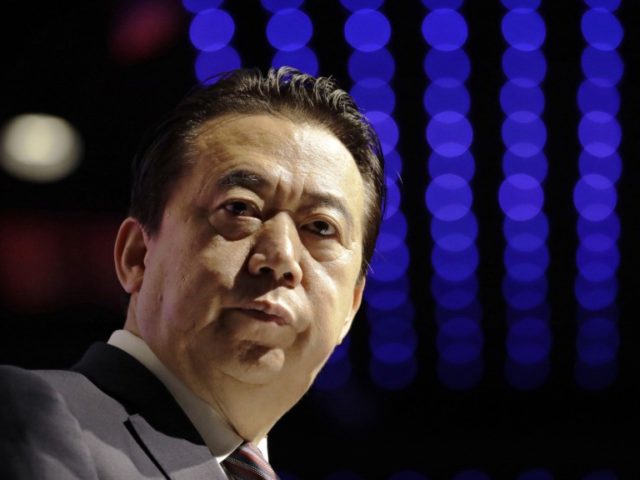China’s Central Commission for Discipline Inspection, responsible for imprisoning Communist Party members accused of corruption, published a document accusing former Interpol President Meng Hongwei of indulging in “lust” and using state officials as servants, the South China Morning Post revealed on Wednesday.
Meng disappeared in October 2018 while on a visit to family in China. Prior to running Interpol, he had enjoyed a long career as a police official and Communist Party member in his home country. Interpol received a mysterious resignation letter shortly thereafter and Meng spent over a year in captivity with little known of his whereabouts. In January 2020, China sentenced him to over 13 years in prison on charges of taking bribes.
The South China Morning Post published details of the government allegations on Wednesday. It is unclear why the Central Commission chose to publish the accusations currently given that Interpol rapidly moved on to another president and Meng’s case had not made any significant headlines recently. Meng’s wife Grace has since, however, sued Interpol at the Permanent Court of Arbitration at The Hague for their lack of action to protect Meng or her family; the documents may be related to that litigation.
The Central Commission details, as translated by the Morning Post, contain numerous insults and insinuations of immoral behavior, targeting not only Meng Hongwei but Grace Meng as well.
“Ever since he began indulging in lust and pleasure, and chasing after an extravagant lifestyle, Meng Hongwei allowed himself to open up to corrupt ideas … trading power for privileges,” a book that the Post claims has been “circulating among senior and mid-ranking officials” detailing the crimes of imprisoned Communist Party members reportedly read. “In the end, he fell into the ‘black hole’ of corruption.”
“After he became the Interpol president, Meng, using excuses like overseas assignments, arranged for a number of cadres and active army officers to serve him and his family in Lyon of France,” the book reportedly continued. “He also turned a blind eye to his wife’s vice. Instead of educating her, Meng made use of his power to arrange for her to take up [senior] positions at several companies earning high salaries.”
The book went on to call Meng “arrogant and extravagant” and accused Grace of stealing Communist Party vehicles.
The Morning Post called the book, which also detailed other cases of Communist Party members accused of corruption, an “unusual” publication given the extent of the insults and details provided.
Someone the Chinese communist regime claimed was Meng appeared in court in Tianjin in January, reportedly having pled guilty to corruption charges and thus not necessitating a trial. Grace Meng questioned if the person was a double, though no evidence to confirm that the man was truly her husband, or refuting it, has since surfaced. The photos of the man circulated on multiple Chinese state media outlets.
Beijing claimed that Meng had taken over $2 million in bribes as a senior member of China’s Public Security Ministry, before becoming president of Interpol. Meng took “advantage of the convenience, power and status generated from his posts to seek benefits for others, illegally accepting money and gifts worth more than 14.46 million yuan from 2005 to 2017,” the regime asserted in June 2019, when photo evidence allegedly of Meng first resurfaced on state media.
Meng served as president of Interpol – a global agency that facilitates communication among state law enforcement entities – for two years before his disappearance. He was the first Interpol president of Chinese descent before his disappearance and, although his past in Communist Party law enforcement had triggered some global unease, perhaps the most notable act of his tenure was to defy Beijing.
Under Meng, China had demanded that Interpol issue a “red notice,” a request for member states to arrest a person, for Dolkun Isa, a human rights activist and head of the World Uyghur Congress. The Uyghur people are a majority-Muslim ethnic minority native to western China, currently enduring extreme human rights atrocities under communism. China is believed to have placed as many as 3 million people, most of them Uyghurs, in concentration camps in Xinjiang, western China, in the past two years.
In February 2018, Interpol canceled the “red notice” request for Isa. While China claims that many Uyghur human rights activists are terrorists, it is not entirely clear what the Communist Party alleged made Isa’s arrest so urgent. Meng lasted seven months as head of the organization following that decision.
In October of that year, after not heading from her husband for days, Grace Meng said she received a text from her husband reading “wait for my call” and a containing a knife emoji, a potential alert that he was in danger. Meng had left for China in September. Shortly after his disappearance, Interpol abruptly revealed that they had received a resignation letter signed in Meng’s name from China.
“We have to accept, like we would accept with any other country, that this country (China) is taking sovereign decisions and if that country tells us: ‘we have investigations, they are ongoing, and the president has been resigning, he’s not a delegate of the country anymore,’ then we have to accept,” Interpol Secretary-General Juergen Stock insisted.

COMMENTS
Please let us know if you're having issues with commenting.